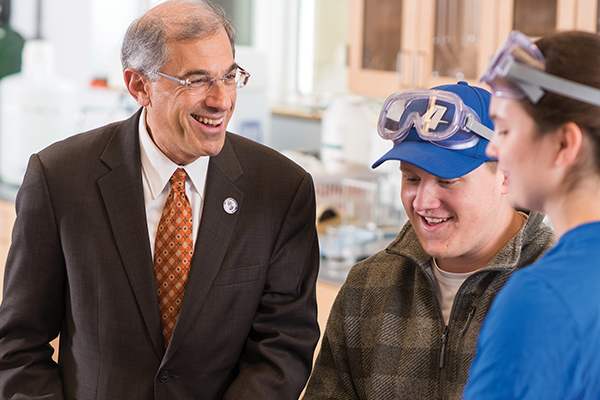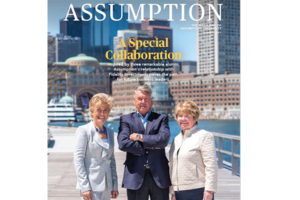 In recent years, there has been intensified focus on encouraging students to study a single subject area to perform a specific task, eschewing a liberal arts education. However, many single-track graduates have discovered that as technology evolves and the economy fluctuates, the needs of the workplace change. The trouble with a single-focused degree education? If the job becomes obsolete, so does the degree; there are no additional skills to fall back on.
In recent years, there has been intensified focus on encouraging students to study a single subject area to perform a specific task, eschewing a liberal arts education. However, many single-track graduates have discovered that as technology evolves and the economy fluctuates, the needs of the workplace change. The trouble with a single-focused degree education? If the job becomes obsolete, so does the degree; there are no additional skills to fall back on.
When Assumption explored new majors that would attract a new type of student to the College, cybersecurity was the focus of many conversations. Admittedly, I was skeptical about how such a major would conform to Assumption’s mission. Then I met with James Trainor ‘87, former assistant director of cybersecurity for the Federal Bureau of Investigation’s Cybersecurity Division.
I asked what type of background the FBI looks for in an applicant. James shared that the bureau did not need technocrats, as such skills can be acquired by enrolling in a handful of courses. Instead, what is needed are individuals who can analyze significant amounts of data and those who can effectively communicate the value of this data in an accessible and useful manner. Ultimately, FBI recruits must be able to write, think, and masterfully articulate their findings. An article I recently read offered a succinct summary of this trend in the modern workforce: “An English major who can write or speak compellingly is just as valuable as a history major who can interpret data.”
This is the core purpose of the liberal arts: to form and educate the next generation of leaders to be malleable, especially for the jobs that do not yet exist. What, then, is the lasting value of a liberal arts education, and can a liberal arts institution survive – and thrive – in this competitive higher education environment in which there are a decreasing number of college-aged students? A recent article in the Wall Street Journal offers an answer:
“Fields of study centered on philosophy, history, literature, art, and music help us appreciate the ambiguity of the world, which in turn exercises our creative muscles. Liberal arts courses don’t offer clearly defined answers to questions. Rather, they nurture disagreement among students and help them develop the ability to marshal cogent arguments in support of defensible positions. The ability to express a viewpoint verbally and then articulate it in writing is a skill that will serve graduates whether they are pitching a business plan to a venture-capital firm or writing a report to shareholders explaining why their portfolios took a hit last quarter.”
A recent survey conducted in collaboration with Assumption’s Career Development and Internship Center (CDIC) found that 94 percent of Assumption’s Class of 2017 are employed, pursuing additional study, in the military, or engaged in volunteer service. In the cover story, alumni share how they have used their liberal arts background to seamlessly switch between careers, many outside their original field of study. You are also invited to read about the Fortin and Gonthier Core Texts and Enduring Questions Program that allows students to explore the great works of human thought and art in a cohesive learning community, where the full potential of the liberal arts enhances the undergraduate experience, preparing students for lives of meaning and purpose after college.
Through the success of our alumni and students, there is no doubt that the liberal arts are a foundation for a lifetime of personal and professional fulfillment and employability.
Francesco C. Cesareo, Ph.D.
President


